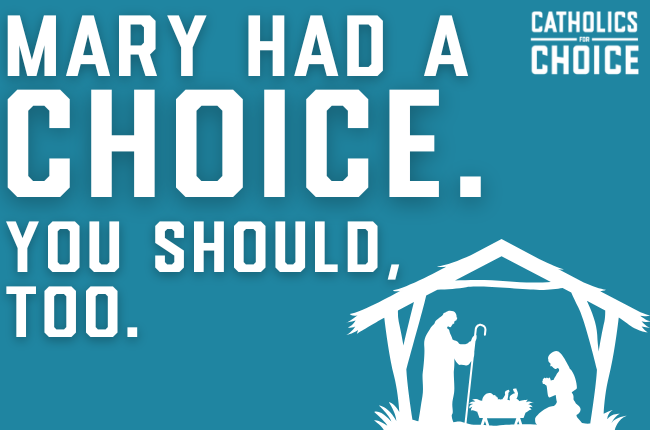Mary had a choice. You should, too.

Mary, Mother of God, chose to become pregnant with Jesus. How do we know? It’s in the Gospel!
When the Angel Gabriel visited Mary, which is called the Annunciation, she explicitly decided to accept the pregnancy:
The angel said to her, “The Holy Spirit will come upon you, and the power of the Most High will overshadow you; therefore the child to be born will be holy; he will be called Son of God. And now, your relative Elizabeth in her old age has also conceived a son; and this is the sixth month for her who was said to be barren. For nothing will be impossible with God.” Then Mary said, “Here am I, the servant of the Lord; let it be with me according to your word.” Then the angel departed from her (Luke 1:35-38).
In this moment, before Christ’s conception, God offered Mary the gift of bodily autonomy. She chose to carry and give birth to Christ. Mary’s testimony “Let it be” (γένοιτό) underscores the power of her consent.
Her “yes” falls in line with the definition of reproductive justice — having the ability to choose if, when, and how to start a family. Mary chose to become pregnant at that moment in her life.
It’s clear that Mary was not actively seeking out pregnancy before the Angel Gabriel appeared. As an unmarried young woman, becoming pregnant would have put her at risk. Some people imply that Mary lacked a choice, that the only acceptable answer would be to submit to the will of God. The implications of this argument are disturbing and reduce Mary to little more than a vessel. As Catholics, we know that a loving God would never force someone to stay pregnant against their will. This is why Mary accepted the responsibility of parenthood. Choosing to give birth is just that — a choice.
This raises the question: if you become pregnant without intending it, should you be given a choice? The Gospel says, “Yes!”
By explicitly seeking definitive consent from Mary to conceive of Christ, God empowered and uplifted her bodily autonomy. It’s clear that reproductive choice is God’s will.
We all deserve to have this same dignity and autonomy over our own bodies. Mary’s “yes” exemplifies the power of reproductive choice. We work for that same reproductive freedom for everyone. Truly, Mary is blessed among women, and the fruit of her womb, Jesus, whom she consented to bring into this world, is blessed as well.

